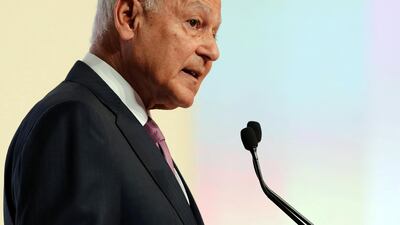Egypt's President Abdel Fattah El Sisi has written to Arab leaders that he intends to nominate Arab League Secretary General Ahmed Abul Gheit for a second five-year term, according to a presidential statement.
The Egyptian leader, it said, was looking forward to the support of the Arab leaders for the nomination of Mr Abul Gheit, a career Egyptian diplomat who served as foreign minister under Hosni Mubarak.
Egypt’s leader for 29 years, Mubarak was forced by a popular uprising to step down in 2011.
The statement quoted presidential spokesman Bassam Rady as saying Mr Abul Gheit showed “wise management” of joint Arab efforts during his first term at a time fraught with challenges in the region.
It is not known whether other Arab states will put forward a nominee of their own or whether Mr Abul Gheit will unanimously win a second term. Qatar had reservations about Mr Abul Gheit's nomination in 2016.
Mr Abul Gheit, 78, took over the helm at the Arab League in March 2016, succeeding veteran diplomat and international law expert Nabil El Araby.
The Arab League, founded in 1945 by six nations, has been heavily criticised in recent years for its inability to act effectively to resolve regional political crises or chart joint foreign policies for its 22 members.
Concerns over national sovereignty and rivalries among its member states, as well as interference by non-Arab regional powers have prevented the league from playing a more effective role in Arab affairs, reducing it - in the eyes of its harshest critics - to no more than a talking shop.
Talk in the league of creating a united nation comprising all Arab states, a dream discussed by some Arab leaders in the 1950s and 1960s, is long abandoned, but has never been replaced by a pragmatic approach.
The league's weakness as an effective regional agency was also laid bare by crises in Libya, Yemen and Syria, and before that in Iraq.
Secretarys general of the Arab League have traditionally come from Egypt, except during 1979-1990 when it was led by a Tunisian diplomat, Chedli Klibi, and its headquarters moved from Cairo to Tunis after the organisation suspended Egypt’s membership for signing a peace treaty with Israel.


